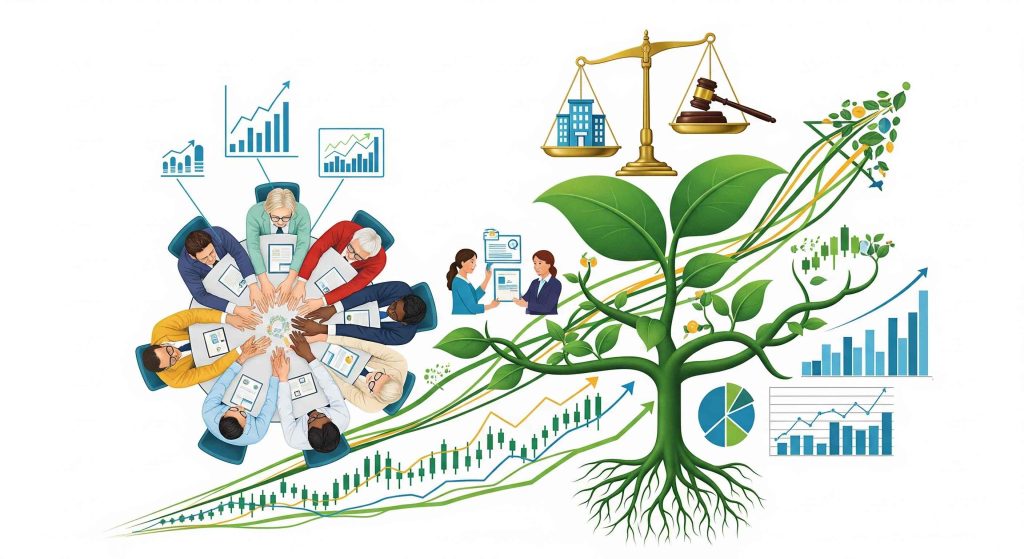Environmental, Social and Governance (ESG) has evolved in recent years from a “nice to have” to a strategic necessity. While the debate has long focused on the costs of sustainable business, recent studies show a different reality: ESG delivers tangible financial benefits. From lower capital costs to increased operational efficiency, organizations that integrate ESG into their business strategy see measurable results in their financial performance.

1. Lower cost of capital: 10 basis points difference
One of the most immediate financial benefits of strong ESG performance is the reduction in capital costs. MSCI research on more than 4,000 companies worldwide shows that organizations with better ESG ratings have systematically lower financing costs.
Concrete figures make this difference clear: A 2024 study of S&P 500 companies found a negative correlation coefficient of -0.17 between ESG scores and debt costs. In practice, this means that companies with high ESG performance can issue their bonds at about 10 basis points lower interest rates.
For a medium-sized Dutch company with €100 million in outstanding debt, this means annual interest savings of €100,000. For larger organizations, these savings quickly add up to millions of euros per year.
Lenders increasingly view ESG performance as indicators of creditworthiness and risk management. This effect is especially strong in stakeholder-oriented countries and bank-based financial systems. And that is exactly the context in which many Dutch companies operate.
2. Operational efficiency: up to 40% cost reduction
ESG initiatives lead to substantial operational savings through improved resource efficiency. Research shows that companies that embrace resource conservation can save more than 40% in waste reduction costs.
A real-life example illustrates this: a manufacturing company that conducted energy audits identified a 15% reduction in energy consumption through lighting upgrades and HVAC optimization. This resulted in 1,000 fewer tons of carbon emissions and significantly lower operating costs. McKinsey research states that ESG efforts can impact operational profits by up to 60% by addressing rising raw material and energy costs.
These efficiency gains arise from:
- Improved energy management systems
- Reduction of material waste
- Optimized logistics processes
- Preventive maintenance through sustainability focus
3. Revenue growth and premium valuation.
ESG performance opens new markets and strengthens customer loyalty. Research shows that consumers are increasingly choosing products from companies whose ESG values match theirs, often even at premium rates.
Dutch companies are already taking advantage of this. Dopper, the Haarlem-based water bottle company, measures success not in market share but in “the number of kilograms of plastic that do not end up in our oceans.” This ESG focus has led to international expansion and strong brand equity.
VodafoneZiggo uses the “People Planet Progress” strategy for all ESG-related communications, which creates recognition without simplifying the vision. Companies perceived as ESG leaders can often charge premium rates and enjoy higher customer loyalty.
Accenture research shows that nearly half of global consumers are strongly motivated to buy environmentally friendly products, which directly impacts revenue generation for ESG-focused companies.
4. Risk mitigation and resilience
ESG practices strengthen organizational resilience to external shocks. During the COVID-19 pandemic, ESG resilient companies showed faster recovery times and more stable revenues.
This effect is not limited to pandemics. Climate risks are increasing: 59% of the Netherlands has increased flood risks. Companies that factor this into location decisions avoid future costs and disruptions.
Supply chain diversification is becoming increasingly important. 79% of companies are diversifying their supplier base, with 71% actively investing in regionalization and localization to reduce risk.
WTW research shows that 77% of risk managers believe the risk function should play a more active role in ESG initiatives, highlighting the growing connection between ESG strategies and risk management.
5. Talent and productivity
Strong ESG performance makes you better at attracting and retaining talent, which directly impacts productivity and profitability. Research confirms that companies with strong ESG reputations are more attractive employers, especially for millennials and Gen Z.
Dutch organizations benefit extra from this due to the tight labor market. Motivated and loyal employees lead to lower staff turnover and higher productivity. For large companies, this can lead to revenue increases and cost reductions of tens of millions of euros per year.
The effect works through several mechanisms:
- Increased employee engagement
- Lower recruitment costs
- Reduced absenteeism
- Enhanced innovation capacity through diverse teams
6. Access to capital: A growing market
The ESG investment market has exploded in recent years. Recent figures show that sustainable investments now represent $52.5 trillion in assets under management, of which $6.5 trillion is explicitly marked as ESG-focused.
80% of institutional investors now consider ESG factors a critical part of investment decisions. 73% of respondents expect the sustainable investment market to grow significantly in the coming years. For Dutch companies, this means that strong ESG performance offers access to an ever-growing pool of capital.
From compliance to value creation
Meta-analysis of 37 peer-reviewed studies between 2014-2024 confirms the positive relationship between ESG performance and financial outcomes. And a large-scale study with 3,332 companies worldwide over 10 years shows that ESG performance is positively correlated with corporate performance (p < 0.01).
The message is clear: ESG is not a cost but an investment in long-term value creation. Dutch organizations that integrate ESG into their core strategy – as CBS, Ahold Delhaize and VodafoneZiggo are already doing – are positioning themselves for financial success in a world where sustainability is increasingly determining business outcomes.
For organizations still hesitant: the question is not whether you can afford ESG, but whether you can afford not to.
